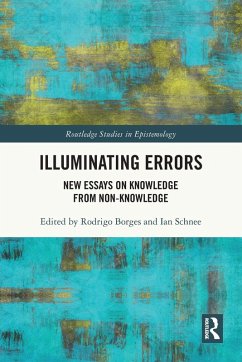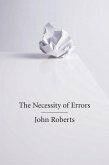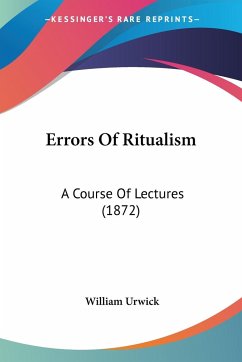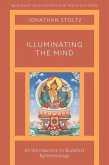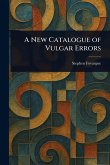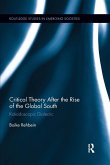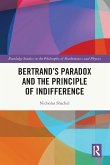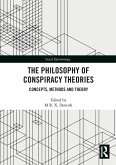Illuminating Errors
New Essays on Knowledge from Non-Knowledge
Herausgeber: Borges, Rodrigo; Schnee, Ian
Illuminating Errors
New Essays on Knowledge from Non-Knowledge
Herausgeber: Borges, Rodrigo; Schnee, Ian
- Broschiertes Buch
- Merkliste
- Auf die Merkliste
- Bewerten Bewerten
- Teilen
- Produkt teilen
- Produkterinnerung
- Produkterinnerung
This is the first collection of essays exclusively devoted to knowledge from non-knowledge and related issues. It features original contributions from some of the most prominent and up-and-coming scholars working in contemporary epistemology.
Andere Kunden interessierten sich auch für
![The Necessity of Errors The Necessity of Errors]() John RobertsThe Necessity of Errors27,99 €
John RobertsThe Necessity of Errors27,99 €![Errors Of Ritualism Errors Of Ritualism]() William UrwickErrors Of Ritualism15,99 €
William UrwickErrors Of Ritualism15,99 €![Illuminating the Mind Illuminating the Mind]() Jonathan StoltzIlluminating the Mind38,99 €
Jonathan StoltzIlluminating the Mind38,99 €![A New Catalogue of Vulgar Errors A New Catalogue of Vulgar Errors]() Stephen FovargueA New Catalogue of Vulgar Errors15,99 €
Stephen FovargueA New Catalogue of Vulgar Errors15,99 €![Critical Theory After the Rise of the Global South Critical Theory After the Rise of the Global South]() Boike RehbeinCritical Theory After the Rise of the Global South52,99 €
Boike RehbeinCritical Theory After the Rise of the Global South52,99 €![Bertrand's Paradox and the Principle of Indifference Bertrand's Paradox and the Principle of Indifference]() Nicholas ShackelBertrand's Paradox and the Principle of Indifference41,99 €
Nicholas ShackelBertrand's Paradox and the Principle of Indifference41,99 €![The Philosophy of Conspiracy Theories The Philosophy of Conspiracy Theories]() The Philosophy of Conspiracy Theories41,99 €
The Philosophy of Conspiracy Theories41,99 €-
-
-
This is the first collection of essays exclusively devoted to knowledge from non-knowledge and related issues. It features original contributions from some of the most prominent and up-and-coming scholars working in contemporary epistemology.
Produktdetails
- Produktdetails
- Verlag: Routledge
- Seitenzahl: 344
- Erscheinungstermin: 28. November 2024
- Englisch
- Abmessung: 229mm x 152mm x 19mm
- Gewicht: 499g
- ISBN-13: 9780367633035
- ISBN-10: 0367633035
- Artikelnr.: 71904744
- Herstellerkennzeichnung
- Libri GmbH
- Europaallee 1
- 36244 Bad Hersfeld
- gpsr@libri.de
- Verlag: Routledge
- Seitenzahl: 344
- Erscheinungstermin: 28. November 2024
- Englisch
- Abmessung: 229mm x 152mm x 19mm
- Gewicht: 499g
- ISBN-13: 9780367633035
- ISBN-10: 0367633035
- Artikelnr.: 71904744
- Herstellerkennzeichnung
- Libri GmbH
- Europaallee 1
- 36244 Bad Hersfeld
- gpsr@libri.de
Rodrigo Borges is a Lecturer at the University of Florida. He works mainly in epistemology. He is currently working on a monograph about the Gettier Problem and knowledge. Ian Schnee is an Associate Teaching Professor at the University of Washington. He is the author of The Logic Course Adventure, an interactive textbook for formal logic courses. Besides epistemology, his research interests include philosophy of film, philosophy of video games, and pedagogy.
Introduction Rodrigo Borges and Ian Schnee Part 1: The Possibility of
Knowledge from Non-Knowledge Section 1: Justification and Essential
Falsehoods 1. Norms of Belief and Knowledge from Non-Knowledge E.J. Coffman
2. We Are Justified in Believing that KFK is Fundamentally Wrong Peter D.
Klein 3. No Knowledge From Falsity Fred Adams 4. Harmless Falsehoods
Martin Montminy 5. Knowledge from Blindspots Rhys Borchert, Juan Comesaña,
and Timothy Kearl Section 2: Gettier, Safety and Defeasibility 6. Knowledge
from Error and Anti-Risk Virtue Epistemology Duncan Pritchard 7. Epistemic
Alchemy? Stephen Hetherington 8. The Benign/Malignant Distinction for False
Premises Claudio de Almeida 9. Knowledge, Falsehood, and Defeat Sven
Bernecker Part 2: Beyond the Possibility of Knowledge from Non-Knowledge
Section 3: Reasoning, Hinges and Cornerstones 10. The Developmental
Psychology of Sherlock Holmes: Counter-Closure Precedes Closure Roy
Sorensen 11. Inferential Knowledge, Counter Closure, and Cognition Michael
Blome-Tillmann and Brian Ball 12. Knowledge from Non-Knowledge in
Wittgenstein's On Certainty: A Dialogue Michael Veber 13. Vaults Across
Reasoning Peter Murphy 14. Entitlement, Leaching and Counter-Closure
Federico Luzzi Section 4: Knowledge: From Falsehoods and of Falsehoods 15.
Why is Knowledge from Falsehood Possible? An Explanation John Turri 16. The
Assertion Norm of Knowing John Biro 17. Knowledge Without Factivity Kate
Nolfi 18. Knowing the Facts, Alternative and Otherwise Clayton Littlejohn
Knowledge from Non-Knowledge Section 1: Justification and Essential
Falsehoods 1. Norms of Belief and Knowledge from Non-Knowledge E.J. Coffman
2. We Are Justified in Believing that KFK is Fundamentally Wrong Peter D.
Klein 3. No Knowledge From Falsity Fred Adams 4. Harmless Falsehoods
Martin Montminy 5. Knowledge from Blindspots Rhys Borchert, Juan Comesaña,
and Timothy Kearl Section 2: Gettier, Safety and Defeasibility 6. Knowledge
from Error and Anti-Risk Virtue Epistemology Duncan Pritchard 7. Epistemic
Alchemy? Stephen Hetherington 8. The Benign/Malignant Distinction for False
Premises Claudio de Almeida 9. Knowledge, Falsehood, and Defeat Sven
Bernecker Part 2: Beyond the Possibility of Knowledge from Non-Knowledge
Section 3: Reasoning, Hinges and Cornerstones 10. The Developmental
Psychology of Sherlock Holmes: Counter-Closure Precedes Closure Roy
Sorensen 11. Inferential Knowledge, Counter Closure, and Cognition Michael
Blome-Tillmann and Brian Ball 12. Knowledge from Non-Knowledge in
Wittgenstein's On Certainty: A Dialogue Michael Veber 13. Vaults Across
Reasoning Peter Murphy 14. Entitlement, Leaching and Counter-Closure
Federico Luzzi Section 4: Knowledge: From Falsehoods and of Falsehoods 15.
Why is Knowledge from Falsehood Possible? An Explanation John Turri 16. The
Assertion Norm of Knowing John Biro 17. Knowledge Without Factivity Kate
Nolfi 18. Knowing the Facts, Alternative and Otherwise Clayton Littlejohn
Introduction Rodrigo Borges and Ian Schnee Part 1: The Possibility of
Knowledge from Non-Knowledge Section 1: Justification and Essential
Falsehoods 1. Norms of Belief and Knowledge from Non-Knowledge E.J. Coffman
2. We Are Justified in Believing that KFK is Fundamentally Wrong Peter D.
Klein 3. No Knowledge From Falsity Fred Adams 4. Harmless Falsehoods
Martin Montminy 5. Knowledge from Blindspots Rhys Borchert, Juan Comesaña,
and Timothy Kearl Section 2: Gettier, Safety and Defeasibility 6. Knowledge
from Error and Anti-Risk Virtue Epistemology Duncan Pritchard 7. Epistemic
Alchemy? Stephen Hetherington 8. The Benign/Malignant Distinction for False
Premises Claudio de Almeida 9. Knowledge, Falsehood, and Defeat Sven
Bernecker Part 2: Beyond the Possibility of Knowledge from Non-Knowledge
Section 3: Reasoning, Hinges and Cornerstones 10. The Developmental
Psychology of Sherlock Holmes: Counter-Closure Precedes Closure Roy
Sorensen 11. Inferential Knowledge, Counter Closure, and Cognition Michael
Blome-Tillmann and Brian Ball 12. Knowledge from Non-Knowledge in
Wittgenstein's On Certainty: A Dialogue Michael Veber 13. Vaults Across
Reasoning Peter Murphy 14. Entitlement, Leaching and Counter-Closure
Federico Luzzi Section 4: Knowledge: From Falsehoods and of Falsehoods 15.
Why is Knowledge from Falsehood Possible? An Explanation John Turri 16. The
Assertion Norm of Knowing John Biro 17. Knowledge Without Factivity Kate
Nolfi 18. Knowing the Facts, Alternative and Otherwise Clayton Littlejohn
Knowledge from Non-Knowledge Section 1: Justification and Essential
Falsehoods 1. Norms of Belief and Knowledge from Non-Knowledge E.J. Coffman
2. We Are Justified in Believing that KFK is Fundamentally Wrong Peter D.
Klein 3. No Knowledge From Falsity Fred Adams 4. Harmless Falsehoods
Martin Montminy 5. Knowledge from Blindspots Rhys Borchert, Juan Comesaña,
and Timothy Kearl Section 2: Gettier, Safety and Defeasibility 6. Knowledge
from Error and Anti-Risk Virtue Epistemology Duncan Pritchard 7. Epistemic
Alchemy? Stephen Hetherington 8. The Benign/Malignant Distinction for False
Premises Claudio de Almeida 9. Knowledge, Falsehood, and Defeat Sven
Bernecker Part 2: Beyond the Possibility of Knowledge from Non-Knowledge
Section 3: Reasoning, Hinges and Cornerstones 10. The Developmental
Psychology of Sherlock Holmes: Counter-Closure Precedes Closure Roy
Sorensen 11. Inferential Knowledge, Counter Closure, and Cognition Michael
Blome-Tillmann and Brian Ball 12. Knowledge from Non-Knowledge in
Wittgenstein's On Certainty: A Dialogue Michael Veber 13. Vaults Across
Reasoning Peter Murphy 14. Entitlement, Leaching and Counter-Closure
Federico Luzzi Section 4: Knowledge: From Falsehoods and of Falsehoods 15.
Why is Knowledge from Falsehood Possible? An Explanation John Turri 16. The
Assertion Norm of Knowing John Biro 17. Knowledge Without Factivity Kate
Nolfi 18. Knowing the Facts, Alternative and Otherwise Clayton Littlejohn

